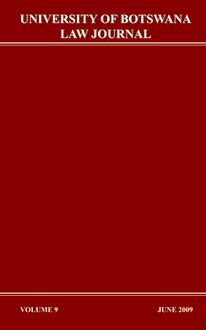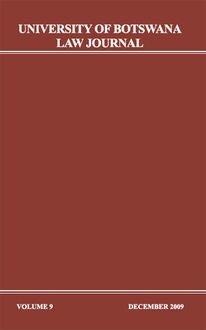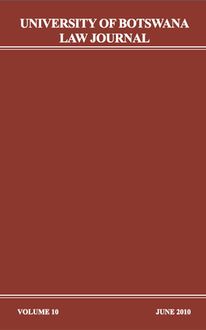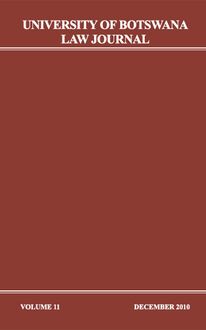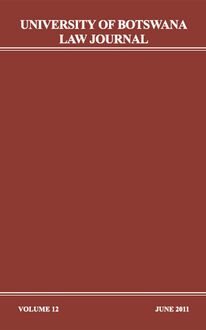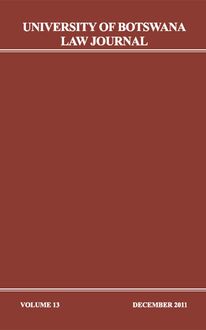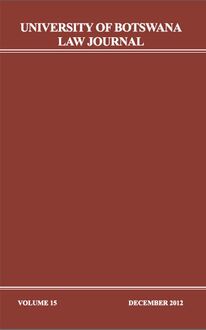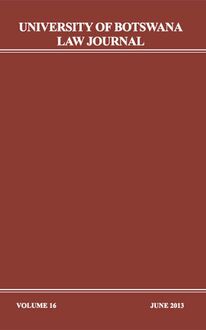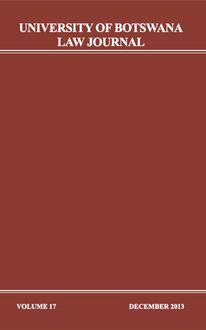-
 Univers
Univers
-
 Ebooks
Ebooks
-
 Livres audio
Livres audio
-
 Presse
Presse
-
 Podcasts
Podcasts
-
 BD
BD
-
 Documents
Documents
-
- Cours
- Révisions
- Ressources pédagogiques
- Sciences de l’éducation
- Manuels scolaires
- Langues
- Travaux de classe
- Annales de BEP
- Etudes supérieures
- Maternelle et primaire
- Fiches de lecture
- Orientation scolaire
- Méthodologie
- Corrigés de devoir
- Annales d’examens et concours
- Annales du bac
- Annales du brevet
- Rapports de stage
La lecture à portée de main
71 pages
English
University of Botswana Law Journal Volume 17, December 2013 , livre ebook
71 pages
English
YouScribe est heureux de vous offrir cette publication

Description
The University of Botswana Law Journal is a peer refereed journal published twice a year. It provides a forum for scholars and practitioners to reflect on diverse legal issues of national, regional and international significance and of local and regional relevance.PatronThe Hon. Justice Nganunu, Chief Justice of BotswanaInternational Editorial Advisory BoardProf. D. D. N. Nsereko, Judge, International Criminal Court, The Hague, The NetherlandsProf. M. Shultz Southern Illinois University School of Law, Carbondale, Illinois, USA Prof. T. Maluwa H. Laddie and Linda P. Montague Professor of Law, Dickinson School of Law, Penn. State University, USA Prof. M. Reisman Myres McDougal Professor of Law, Yale Law School, New Haven, USAProf. M. Blakeney Professor of Law, Faculty of Law, University of Western Australia, Australia Prof. A. McCall Smith Edinburgh Law School, University of Edinburgh, United Kingdom Prof. C. Forsyth Faculty of Law, Robinson College, University of Cambridge, United Kingdom Prof. B. Othlogile Vice Chancellor, University of Botswana Dr. A. Molokomme Attorney-General, BotswanaEditorial BoardProf. K.A. Acheampong Editor-in-Chief, University of BotswanaMrs. E. Macharia-Mokobi Secretary, University of BotswanaDr. T. Balule University of BotswanaProf. C. Ng’ong’ola University of BotswanaDr. R.J.V. Cole University of BotswanaDr. N. Swartz University of BotswanaMrs. H. Nuru University of Botswana
Sujets
Informations
| Publié par | PULP (Pretoria University Law Press) |
| Nombre de lectures | 0 |
| Langue | English |
Extrait
UNIVERSITY OF BOTSWANA LAW JOURNAL
VOLUME 17 DECEMBER 2013
ARTICLES
Nationality as an essential ingredient of diplomatic protection: Article 9 of the International Law Commission Draft Articles considered ............................................................................3 Amos O. Enabulele and Anthony Osaro Ewere
Who is a tribesman? An examination of the continued utility of Section 3 of Botswana’s Administration of Estates Act...........................23 E Macharia-Mokobi
Balancing contending interests: A focus on tax harmonisation and associated policy issues ............................................................................37 Aniyie I. Azuka
NOTES
Electoral democracy in Africa: A critique of jealousy Mbizvo MawarirevRobert Gabriel Mugabe N.O. and 4 OthersCCZ 1/13....................................................................................55 Gift Manyatera and Chengetai Hamadziripi
The abolition of the doctrine of immutability in the matrimonial property regime in Botswana ...............................................65 Tebogo Jobeta and Obonye Jonas
ARTICLES
3
Nationality as an essential ingredient of diplomatic protection: Article 9 of the International Law Commission Draft Articles considered
ABSTRACT
Amos O. Enabulele* Anthony Osaro Ewere*
The rule regarding the nationality of companies laid down in Barcelona Traction Light and Power Company held that incorporation alone confers nationality on corporations for purposes of the espousal of claim by states. However, the article argues that section 9 of the ILC draft Articles on Diplomatic protection seem to extend this principle to include the state where a corporation has its substantial business and its seat of financial and management control. The authors argue against draft article 9 endeavouring to show that it is unsupported by state practice and decisions of international tribunals. They argue that draft article 9 is an attempt to apply the ‘genuine link’ principle which was at the root of the Nottebohm case to corporations, which, not being natural persons, are incapable of dual nationality.
1.
INTRODUCTION
This paper discusses the role of the bond of nationality in the diplomatic protection of corporations. It specifically discusses article 9 of the International Law Commission (ILC) Draft Articles on Diplomatic Protection. It queries a provision in the Draft article 9 which seeks to broadly define the nationality of corporation to include States other than States in which the corporation was incorporated. The paper argues that such a broad formulation does not conform to the well-established rule of customary international law on the point. The rule which is followed by both national courts and international courts is that, for the purpose of diplomatic protection, incorporation alone confers nationality on corporations. The writers shall, therefore, discuss the ILC Draft in the light of the robust discussion of the nationality rule inBarcelona 1 Traction, Light and Power Company Ltd,with a view to discovering whether there was any indication in the case towards the principle underlying the
1*
**
1
LLM, PhD (Lond.) BL, Senior Lecturer, Department of Jurisprudence and International Law, Faculty of Law, University of Benin, Nigeria; barrister and solicitor of the Supreme Court of Nigeria. LL.B, LL.M, BL, Lecturer, Department of Private and Property Law, Faculty of Law, University of Benin, Nigeria and PhD student at the University of Benin, Nigeria. (New Application: 1962) (BelgiumvSpain),ICJ Rep 1970, 3.
4 UNIVERSITY OF BOTSWANA LAW JOURNAL DECEMBER 2013
exception sought to be accommodated in the ILC Draft. This is in view of the strenuous reliance placed on the case in the Commentaries that accompanied the Draft article 9. The following discussion is divided into nine parts; each part discusses an aspect of the subject that is relevant to this discussion.
2.
WHAT IS DIPLOMATIC PROTECTION?
‘Diplomatic protection is premised on afiction: injury to an individual is treated as if it constituted injury to the individual’s national state, entitling the 2 national state to espouse the claim’.In practice, every State has a duty to treat an alien within its territory with the standard accepted under international law – defined in terms of the violations of the minimum standard of treatment of 3 aliens, including,inter alia, internationally guaranteed human rights. Where a State fails in this duty, the failure triggers the right of the alien’s State of nationality to exercise protection over the alien by arbitration, judicial settlement, by negotiation or by other means. For:
“It is an elementary principle of international law that a State is entitled to protect its subjects, when injured by acts contrary to international law committed by another State, from whom they have 4 been unable to obtain satisfaction through the ordinary channels.”
A State that exercises this protection is said to have exercised its right of diplomatic protection.
3.
WHO CAN EXERCISE DIPLOMATIC PROTECTION?
In the current state of international law, only States have the faculty to exercise diplomatic protection. This protection is exercised on the basis of nationality 5 of claims, and follows the firmly established rule of customary international law that no State can exercise diplomatic protection except the State is connected by a single factor – nationality – with the individual or corporation on whose behalf the right is being exercised. As explained by Judge Read, ‘[n]ationality and diplomatic protection are closely inter-related. The general
2
3
4 5
Annemarieke Vermeer-Künzli, ‘As If: The Legal Fiction in Diplomatic Protection’ 18(1) EJIL 37, 37 (2007) Ahmadou Sadio Diallo (Republic of GuineavRepublic of the Congo), Preliminary Democratic Objections, ICJ Rep 2007, 582, 599, para 39. Mavrommatis Palestine Concession case (GreecevUnited Kingdom) PCIJ,Series A, No. 2 (1924)p. 12. As the writers shall show later, however, there is an indication of principle in the decision of the ICJ in the Reparation for Injuries Suffered in the Service of the United Nationstowards international organisations possessing the faculty to exercise the right to protect its staff by making international claims.
ARTICLE 9 OF THE INTERNATIONAL LAW COMMISSION DRAFT ARTICLES 5
rule of international law is that nationality gives rise to a right of diplomatic 6 protection’. The juridical basis of diplomatic protection lies in the fictional translocation of a wrong done by a foreign State to an individual as a wrong done to the individual’s State of nationality. As a result, ‘by taking up the 7 claim of one of its subjects ... a State is in reality asserting its own rights’. And from the moment a State adopts the case of its national, the dispute enters the 8 domain of international law to become a dispute between two States. Once it enters the domain of international law, the State of nationality, rather than the 9 individual, is the sole claimant. To quote Judge Read again:
“by admitting the alien, the State, by its voluntary act, brings into being a series of legal relationships with the State of which he is a national. As a result of the admission of an alien, whether as a permanent settler or as a visitor, a whole series of legal relationships come into being. There are two States concerned, to which I shall refer as the receiving State and the protecting State. The receiving State becomes subject to a series of legal duties vis-à-vis the protecting State, particularly the duty of reasonable and fair treatment. It acquires rights vis-à-vis the protecting State and the individual, particularly the rights incident to local allegiance and the right of deportation to the protecting State. At the same time the protecting State acquires correlative rights and obligations vis-à-vis the receiving State, particularly a diminution of its rights as against the individual resulting from the local allegiance, the right to assert diplomatic protection and the obligation to receive the individual on 10 deportation ...”
This rule, which was for a long time was applied only to individuals, is now frequently applied to corporations, as instances of the device of transnational corporations have become a model of international economic activities. Accordingly, as it is with the protection of individuals, nationality is a core element in the international law of diplomatic protection of corporations. In simple terms, a State desirous of exercising the right of
6 7
8
9 10
Dissenting inNottebohm(LiechtensteinvGuatemala) (Second Phase)ICJ Rep 1955, 4, 46. Mavrommatis Concession, ibid;Panevezys-Saldutiskis Railway case,of February 28, 1939, Judgment Series A/B, No. 76, p. 17. This has been consistently followed by the ICJ as well. SeeBarcelona Traction,note 1, p 44 para 78. SeeMavrommatis Palestine Concession case (GreecevUnited Kingdom)PCIJ, Series A,No. 2 (1924) p. 12. Ibid. Dissenting inNottebohm(Second Phase) note 6, p. 46-47.
6 UNIVERSITY OF BOTSWANA LAW JOURNAL DECEMBER 2013
11 protection on behalf of a corporation must establish the bond of nationality. Absent such a bond, the State will be held incompetent to espouse the claim. As clearly held by the ICJ inBarcelona Traction, it is only the bond of nationality that is sufficient to conferlocus standifor an action of this nature. In other words, under the rules of customary international law governing diplomatic protection, other than the nationality of claims, there is no other proximate link (no matter how strong) that can ground a diplomatic protection claim by a State that is not the State of nationality of the corporation sought to be protected.
4.
INTERNATIONAL LAW RELIES ON THE RULES OF NATIONALITY ESTABLISHED UNDER MUNICIPAL LAW
The long established rule applied by international courts is that nationality belongs to the matters which are reserved for the internal jurisdiction of every State. As a result, it is a sphere in which every State is at liberty to maintain its own rules. This rule has been followed by both the PCIJ and the ICJ. In the 1923Advisory Opinion in the Case between Great Britain and France as to the 12 Tunis and Morocco Nationality Decrees,the PCIJ declared that ‘in the present state of international law, questions of nationality, are, in the opinion 13 of the court, in principle within the reserved domain’ [of states]. Three-quarter of a century later, the ICJ still maintains the rule that nationality belongs to the reserved domain. As examples, the decision of the court in Nottembolm, wherein it affirmed ‘wider concept that nationality is within the 14 domestic jurisdiction of the State’, was in essence, followed inBarcelona 15 16 TractionandAhmadou Sadio Diallois even as the court admitted in. This Barcelona Tractionthat:
11
12
13 14 15 16 17
“whenever legal issues arise concerning the rights of States with regard to the treatment of companies and shareholders, as to which rights international law has not established its own rules, it has to 17 refer to the relevant rules of municipal law.”
Craig Forcese, ‘The Capacity to Protect: Diplomatic Protection of Dual Nationals in the “War on Terror”, 17(2) EJIL 369, 379 (2006) (Affirming that ‘a bond of nationality between the state extending protection and the individual claiming this protection is the sine qua non of traditional rules of diplomatic protections’). Advisory opinion No. 4 Series A. PCIJ 1923. For a discussion of the reserved domain, see J.L Brierly, ‘The Shortcomings of International Law’ 5 Brit. Y.B Int’l L. 4 (1924); J.L. Brierly, ‘Matters of Domestic Jurisdiction, 6 Brit. Y.B. Int’l L. 8, 9-10 (1925); Amos O Enabulele, ‘The Reserved Domain: Brierly’s ‘Shortcomings of International Law Revisited’, 13(1) University of Benin Law Journal, 25, (2010-2012). Ibid,p.23-24. Ibid, p. 20. Note 1. Note 3. Note 1, pp. 33-34, para 38.
ARTICLE 9 OF THE INTERNATIONAL LAW COMMISSION DRAFT ARTICLES 7
One thread that must run through the definition of nationality of corporations under municipal laws is that nationality arises only from the fact of incorporation. There is yet no established practice of States or of courts, both municipal and international, in which nationality of claims in relation to corporation was recognised in disregard of the basic rule that incorporation alone confers nationality. Importantly, from this rule of municipal law, the ICJ has said it cannot retract. Accordingly, inNottembohm, the ICJ affirmed that it is for Liechtenstein, ‘as it is for every sovereign State, to settle by its own legislation the rules relating to the acquisition of its nationality, and to confer that nationality by naturalization granted by its own organs in accordance with 18 that legislation.’ The court explained that ‘nationality has its most immediate; its most far-reaching; and, for most people, its only effects within the legal system of the State conferring it. Nationality serves, above all, to determine that the person upon whom it is conferred, enjoys the rights and is bound by the obligations which the law of the State in question grants to, or 19 imposes on its nationals’. Having briefly stated the traditional view, the writers shall now seek to determine the extent to which article 9 of the ILC Draft Articles on Diplomatic Protection conforms to this well-established approach discussed above.
5.
NATIONALITY OF CLAIMS OF CORPORATION
As stated in the preceding section, in the field of diplomatic protection, international law does not have its own rules for ascribing nationality; it relies on the rule of municipal law of the State conferring nationality in any particular instance. In doing this, however, international courts are mindful of the diversity of rules that may exists in different States with the consequence that the laws of one State may be not opposable to those of another on the question of nationality. In consequence, the court addresses itself to the concept of genuine connection between a State seeking to exercise diplomatic protection and the individual on whose behalf a case is sought to be espoused. The court uses this concept to resolve any doubt that may be cast on the right of a State of nationality to exercise protection in any particular case in which only a tenuous connection exist between the claimant State and the individual. Accordingly:
18 19
“A State cannot claim that the rules it has thus laid down are entitled to recognition by another State unless it has acted in conformity with this general aim of making the legal bond of nationality accord
Nottembolm,note 6, p. 20. Nottembolm, ibid,p. 20.
8 UNIVERSITY OF BOTSWANA LAW JOURNAL DECEMBER 2013
with the individual’s genuine connection with the State which assumes the defence of its citizens by means of protection as against 20 other States.”
In rationalising this position, the court explained:
“nationality is a legal bond having as its basis a social fact of attachment, a genuine connection of existence, interests and sentiments, together with the existence of reciprocal rights and duties. It may be said to constitutethe juridical expression of the fact that the individual uponwhom it is conferred, either directly by the law or as the result ofan act of the authorities, is in fact more closely connected with thepopulation of the State conferring nationality than with that ofany other State. Conferred by a State, it only entitles that Stateto exercise protection vis-à-vis another State, if it constitutes atranslation into juridical terms of the individual's 21 connection withthe State which has made him its national.”
With regard to corporations, nationality is still the defining factor when considering a case of diplomatic protection. In allocating nationality to corporations, international law recognises the rule of general application under the municipal law of various nations that corporations limited by shares are a body corporate; they possess a separate legal personality from their 22 shareholders.This view was affirmed by the ICJ inAhmadou Sadio Diallo, when it stated that ‘... international law has repeatedly acknowledged the principle of domestic law that a company has a legal personality distinct from 23 that of its shareholders’.Being a juridical person, one of the legal attributes corporations enjoy is the nationality of the State of their birth, and this is the State wherein they were incorporated. According to the ICJ:
20 21 22 23 24
“In allocating corporate entities to States for purposes of diplomatic protection, international law is based, but only to a limited extent, on an analogy with the rules governing the nationality of individuals. The traditional rule attributes the right of diplomatic protection of a corporate entity to the State under the laws of which it is incorporated and in whose territory it has its registered 24 office.”
Nottembolm, ibid,p. 23. Ibid, p. 23. SalomonvSalomon & Company Ltd,[1897] AC, 22. (Republic of GuineavDemocratic Republic of the Congo), Merits, ICJ Rep 2010, 639, 689, para 155. Barcelona Traction,note 1,p. 42, para 70.
ARTICLE 9 OF THE INTERNATIONAL LAW COMMISSION DRAFT ARTICLES 9
This was as much the whole essence of the decision of the ICJ in determining the state having the right of protection of Barcelona Traction, Light and Power Company Ltd. The ICJ heavily relied on the fact of incorporation to hold that the State of nationality of the company was Canada, the State of its incorporation, though its business interest was predominantly 25 in Spain and its shareholders predominantly of Belgium nationality. It is in order to state at this point that the fact of the fictional existence of a corporate entity as a legal person limits its mode of acquisition of nationality to the one acceptable means of incorporation. Unlike natural persons, they can neither maintain dual nationality nor change their nationality. This is indisputably so because as many times as a particular company is incorporation in different States, as many times does it acquire a new legal personality distinct from the personality any part of the same company may possess in another State; each part is, for the purpose of nationality, peculiar to the law of its incorporation. In the Nigerian case ofMarina Nominees Ltd vFederal Board of 26 Inland Revenue, Peat Marwick Casselton Elliot & Co, a firm of Accountants, incorporated the appellant company in Nigeria, as a company limited by shares. The company was to perform secretariat duties to a number of its client-companies. All the members of staff of the appellant were employees of Peat Marwick. The dispute in the case was whether the appellant incorporated under the Companies Act 1968 should be liable to pay income tax under the Companies Income Tax Act 1961. It was argued on behalf of the appellant that the appellant acted as agents of Peat Marwick and that there will be a case of double taxation as the income earned by the appellant belonged to Peat Marwick which has paid its own tax. The Body of Appeal Commissioners, the Federal High Court and Court of Appeal rejected the contention and upheld the position of the respondent that the appellant was liable to pay income tax as an entity different from Peat Marwick. This led to a further appeal to the Supreme Court of Nigeria. In its decision, the court held that an incorporated company must be regarded as a separate entity from anyone of its shareholders; that a company registered under the Act has a separate independent existence and should be treated like any other independent person with its rights and liabilities appropriate to itself 27 as the company must fulfil its own obligations under the law. The judgment was based on the rule that a limited liability company registered under the laws of Nigeria enjoys a distinct legal personality with rights and duties under
25 26 27
Ibid.[1986] 2 NWLR (Pt.20) 48. Ibid, pp. 55-56. See alsoLeevLee Air Farming Ltd[1961] AC 12 where the court recognised the separate legal personality of a company under the laws of the country where it was registered; Orojo, J.O. rd Company Law and Practice in Nigeria, 82 (3 ed. Lagos: Mbeyi & Associates, 1992) (opining that such registered companies are liable to pay tax to the relevant authorities of the incorporating country).
10 UNIVERSITY OF BOTSWANA LAW JOURNAL DECEMBER 2013
the laws of Nigeria. The implication of this necessarily complements the point already made above is that it is only the State in which a company was registered, in the absence of an agreement to the contrary, that has capacity to exercise protection over a wrong done to the company. The implication would be that the State of nationality of a parent company lacks the capacity to exercise protection in respect of a wrong done to a subsidiary of the company which was registered as a separate personality under the law of a different State to that in which the parent company was registered. This is irrespective of how varied the nationality of its shareholders may be, and how tenuous its connection with the state of incorporation may be. The ILC Draft articles materially defers from this view.
6.
ARTICLE 9 OF THE ILC DRAFT ARTICLES
Article 9 of the International Law Commission Draft Articles on Diplomatic 28 Protection (ILC Draft Articles), 2006, provides:
“For the purposes of the diplomatic protection of a corporation, the State of nationality means the State under whose law the corporation was incorporated. However, when the corporation is controlled by nationals of another State or States and has no substantial business activities in the State of incorporation, and the seat of management and the financial control of the corporation are both located in another State, that State shall be regarded as the State of nationality.”
In the Commentary on this article, it was emphasised that the Draft article 9 provides is intended to establish that the State in which a corporation is incorporated is the State of nationality and thus the State entitled to exercise diplomatic protection respecting wrongs done to the corporation. It was further explained, by way of an exception to the general rule, that when the circumstances indicate that the corporation has a closer connection with another State – a State in which the seat of management and financial control are situated – that State shall be regarded as the State of nationality and thus 29 be entitled to exercise diplomatic protection. The Commentary further identified three conditions that must be cumulatively fulfilled before a State other than the State of incorporation of a corporation can be held to be its State of nationality for the purpose of diplomatic protection. These are: (a) the
28
29
The text was adopted by the ILO at its fifty-eight session (2006) and submitted to the General Assembly of the United Nations as part of the Commission’s Report. See Yearbook of the ILO, 2006, Vol. II Part II Article 5 of the commentaries on Draft article 9.
ARTICLE 9 OF THE INTERNATIONAL LAW COMMISSION DRAFT ARTICLES 11
corporation must be controlled by nationals of another State; (b) the corporation must have no substantial business activities in the State of incorporation; and (c) both the seat of management and the financial control 30 of the corporation must be located in another State. 31 In view of the reasoning of the court in theBarcelona Traction, that the grant of theright of diplomatic protection to the States of nationality of shareholders might result inmultiplicity of actions which could lead to an 32 atmosphere of confusion and insecurity in international economic relations, it was stressed that the:
“Draft article 9 does not allow such multiple actions. The State of nationality with the right to exercise diplomatic protection is either the State of incorporation or, if the required conditions are met, the State of the seat of management and financial control of the corporation. If the seat of management and the place of financial control are located in different States, the State of incorporation 33 remains the State entitled to exercise diplomatic protection.”
It is here observed that neither in the Draft Article 9 nor in its Commentaries was the exception sought to be introduced in the second limb of the Draft Article properly accounted for in view of the age-long practice of both national courts and international courts that nationality of corporations alone was the relevant consideration. To buttress this observation, the writers shall now discuss the Draft Article in relation to the existing customary international law as applied in theBarcelona Traction, with a view to determining whether the case which was strenuously relied upon in the Commentary points to an indication of the principle sought to be codified in the Draft Articles. In order to make their points as clearly as possible, the writers shall divide this Draft articles into two separate parts and discussed accordingly.
7.
THE STATE OF INCORPORATION OF A CORPORATION IS ITS STATE OF NATIONALITY
As regards this part, there is no controversy, in that it reflects the accepted customary international law position that the State of nationality of a corporation is the corporations State of incorporation; and that, except prescribed by agreement, it is this State that has the right to exercise diplomatic protection on its behalf.
30 31 32 33
Ibid.Note 1. Note 28, p. 111. Ibid, para 6 of the Commentary.
-
 Univers
Univers
-
 Ebooks
Ebooks
-
 Livres audio
Livres audio
-
 Presse
Presse
-
 Podcasts
Podcasts
-
 BD
BD
-
 Documents
Documents
-
Jeunesse
-
Littérature
-
Ressources professionnelles
-
Santé et bien-être
-
Savoirs
-
Education
-
Loisirs et hobbies
-
Art, musique et cinéma
-
Actualité et débat de société
-
Jeunesse
-
Littérature
-
Ressources professionnelles
-
Santé et bien-être
-
Savoirs
-
Education
-
Loisirs et hobbies
-
Art, musique et cinéma
-
Actualité et débat de société
-
Actualités
-
Lifestyle
-
Presse jeunesse
-
Presse professionnelle
-
Pratique
-
Presse sportive
-
Presse internationale
-
Culture & Médias
-
Action et Aventures
-
Science-fiction et Fantasy
-
Société
-
Jeunesse
-
Littérature
-
Ressources professionnelles
-
Santé et bien-être
-
Savoirs
-
Education
-
Loisirs et hobbies
-
Art, musique et cinéma
-
Actualité et débat de société
- Cours
- Révisions
- Ressources pédagogiques
- Sciences de l’éducation
- Manuels scolaires
- Langues
- Travaux de classe
- Annales de BEP
- Etudes supérieures
- Maternelle et primaire
- Fiches de lecture
- Orientation scolaire
- Méthodologie
- Corrigés de devoir
- Annales d’examens et concours
- Annales du bac
- Annales du brevet
- Rapports de stage
Signaler un problème
YouScribe
Le catalogue
Le service
© 2010-2024 YouScribe
